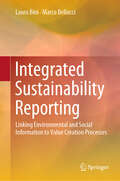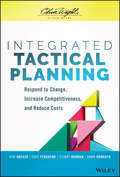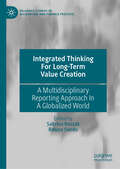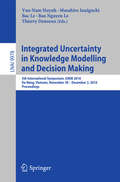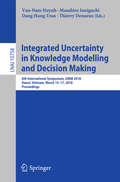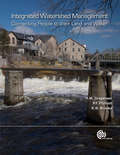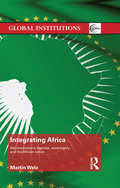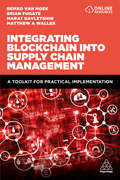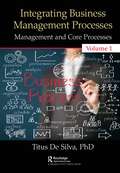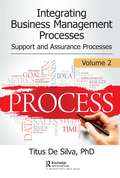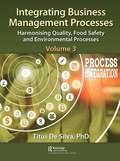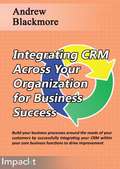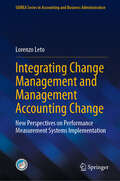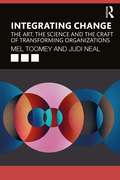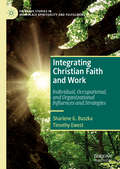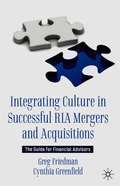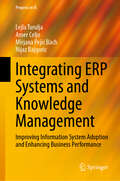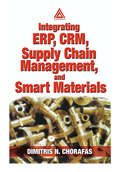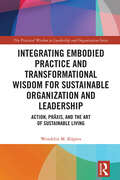- Table View
- List View
Integrated Sustainability Reporting: Linking Environmental and Social Information to Value Creation Processes
by Marco Bellucci Laura BiniThis book proposes an integrated approach to sustainability reporting, the goal being to overcome certain limitations of the well-established additive approach, where the reporting of environmental, social and economic issues is sequential, but separate. It argues that, in order to successfully communicate its commitment to sustainability, a company should report on how environmental and social issues impact its way of doing business, namely its business model, contributing to value creation. Thus, a reporting framework for business models that encompasses sustainability is presented. In turn, a number of illustrative examples are examined to show how business model reporting could be optimally used to provide effective and integrated sustainability reporting. The book also offers a broad analysis of corporate sustainability reporting, which includes a discussion of the theoretical background, an explanation of why companies provide sustainability reporting, a description of the current regulatory framework for sustainability disclosure, and a review of sustainability reporting literature that shows the main characteristics of sustainability disclosure practices. Given its scope, the book will be of interest to all researchers and practitioners working for companies or organizations that aim to support, implement and improve their sustainability reporting, by adopting a more integrated approach that interconnects environmental and social aspects with the economic and financial results via the business model. The book also offers a valuable reference guide for social science researchers, including PhD students, interested in a discussion of the latest literature on sustainability, corporate social responsibility, and the communication of business models.
Integrated Tactical Planning: Respond to Change, Increase Competitiveness, and Reduce Costs
by Rod Hozack Stuart Harman Todd Ferguson Dawn HowarthThe experts at Oliver Wight provide business leaders with invaluable information for integrating the tactical planning process Integrated Tactical Planning (ITP) is an essential process for regularly re-aligning product, demand, and supply plans in the short term, thereby giving the Executive team the confidence that operational activities are being well managed, unless they formally hear otherwise. This cross-functional re-planning process is vital to responding to change, increasing competitiveness, and reducing costs. Integrated Tactical Planning: Respond to Change, Increase Competitiveness and Reduce Costs helps senior executives devote more time to strategy and other value-added activities by deploying ITP practices throughout their organization. Written by the leadership team at Oliver Wight, one of the world’s most respected firms for effectively integrating business processes and improving business outcomes, this authoritative resource offers a contemporary view of the processes, behavior change methods, and new technology for implementing ITP processes. Throughout the text, the authors share business-proven concepts, define fundamental terms, and provide real-life examples of how Integrated Tactical Planning has been applied in various industries and businesses. Clear and accurate chapters cover essential topics including strategy alignment, product and demand plan execution, supply scheduling, performance improvement, and more. Presenting the information necessary to get an organization started on its Integrated Tactical Planning journey, this book: Describes how to manage and align product portfolio changes and new products within a single management process Explains the mechanisms and behavioral requirements for an organization to successfully execute Integrated Tactical Planning Offers methods for improving reaction time and cost-effectively responding to changes in Demand and Supply Reviews different design and deployment strategies, structures and roles, and the key ITP elements such as process definition and sustainability Features a comprehensive case study that details the challenges and results experienced by an Oliver Wight client company that implemented Integrated Tactical Planning Integrated Tactical Planning: Respond to Change, Increase Competitiveness and Reduce Costs is a must-have book for senior executives, leaders, managers, and planners at organizations of any size across all industries.
Integrated Thinking For Long-Term Value Creation: A Multidisciplinary Reporting Approach In A Globalized World (Palgrave Studies in Accounting and Finance Practice)
by Sabrina Roszak Raluca SanduThis book, structured in two parts, gives a 360-degree view on integrated thinking, the foundation of integrated reporting, a rising trend in corporate reporting practice. This topic is particularly interesting in the context of new regulatory landscape, such as the Corporate Sustainability Reporting Directive (CSRD) in the EU (shaped by EFRAG's developments), alongside the IFRS Foundation's efforts towards global sustainability standards, both of which are shaping contemporary debates on sustainable value creation. The first part builds a framework for integrated thinking in a multidisciplinary perspective while the second part revises the framework in the light of practices, by bridging the gap with research findings in this field to date. The book concludes with the current shift of paradigm, and the need to address managerial questions in their complexity, building on knowledge across different specialized disciplines. The book will be of specific interest to accounting and finance teams and professional accounting bodies alongside those teaching or doing research within the fields of finance and accounting.
Integrated Uncertainty in Knowledge Modelling and Decision Making
by Van-Nam Huynh Thierry Denoeux Masahiro Inuiguchi Bac Le Bao Nguyen LeThis book constitutes the refereed proceedings of the International Symposium on Integrated Uncertainty in Knowledge Modeling and Decision Making, IUKM 2013, held in Beijing China, in July 2013. The 19 revised full papers were carefully reviewed and selected from 49 submissions and are presented together with keynote and invited talks. The papers provide a wealth of new ideas and report both theoretical and applied research on integrated uncertainty modeling and management.
Integrated Uncertainty in Knowledge Modelling and Decision Making: 6th International Symposium, IUKM 2018, Hanoi, Vietnam, March 15-17, 2018, Proceedings (Lecture Notes in Computer Science #10758)
by Van-Nam Huynh Thierry Denoeux Masahiro Inuiguchi Dang Hung TranThis book constitutes the refereed proceedings of the 6th International Symposium on Integrated Uncertainty in Knowledge Modelling and Decision Making, IUKM 2018, held in Hanoi, Vietnam, in March 2018.The 39 revised full papers presented in this book were carefully reviewed and selected from 76 initial submissions. The papers are organized in topical sections on uncertainty management and decision support; clustering and classification; machine learning applications; statistical methods; and econometric applications.
Integrated Watershed Management: Connecting People to Their Land and Water
by Kenneth N. Brooks Hans M. Gregersen Peter F. FolliottGregersen, Folliott, and Brooks provide government agencies and other bodies with background information, factors to be considered, and procedures that facilitate organizing and guiding land and water use in concert with one another. The book can also serve as a reference for planning, monitoring, and implementing development efforts and natural resource management using the integrated watershed management approach. Annotation ©2008 Book News, Inc., Portland, OR (booknews.com)
Integrating Africa: Decolonization's Legacies, Sovereignty and the African Union (Global Institutions)
by Martin WelzThe African Union (AU) is a continental organization that comprises every African state except for Morocco, is indeed a pioneering undertaking. Its ambitious aim is to integrate all member states, with the ultimate goal of forming the United States of Africa. Despite several attempts to build a union, the AU has remained an intergovernmental organization, one reason being a perceived unwillingness of the AU states to pool their national sovereignties. This study seeks to comprehend why Africa’s integration process has not moved towards a supranational organization, using a novel approach. It shifts the usual perspective away from the organization level and provides the first comprehensive and systematic analysis of the AU from the perspective of the states themselves. It includes 8 comprehensive case studies: Algeria, Burkina Faso, Ethiopia, Mauritius, South African, Swaziland, Uganda and Zimbabwe to help understand their foreign policy and provide key insights into why they are (un)willing to yield sovereignty. This work will be of great interest to students and scholars of African politics, international relations and international organizations.
Integrating Avocent Corporation into Emerson Network Power
by Prithwiraj Choudhury Vincent M. ServelloThis case reviews Emerson Electric's proposed acquisition of Avocent Corporation in 2009. The focus of this case is how a technology company such as Avocent, with a dramatically different business model compared to its acquirer, should be integrated into a large, multi-industry conglomerate like Emerson. Underlying this managerial question is a broader strategy question-under what conditions should the acquiring firm A modify its own business model and/or fold itself into its acquisition B, rather than trying to integrate B into the old business model? The case also touches upon themes related to the management of human capital during the acquisition of a technology startup.
Integrating Beam Suntory (A)
by David Lane Rawi Abdelal David G. FubiniThe spring 2014 acquisition of U.S. alcoholic spirits maker Beam Inc. by Japan's Suntory Holdings vaulted Suntory from 15th to third-largest international spirits company in the world. Yet Suntory had borrowed nearly the entire $16 billion purchase price, and relied on Beam to fund repayment of that debt. In October 2014, Takeshi Niinami became Suntory's president and CEO, the first outsider to run the family business since its 1899 founding. Niinami immediately faced governance issues-not least relating to his relationship with Beam CEO Matt Shattock-and sought to enhance Beam's production quality and consumer focus without alienating either Beam management and staff or the family that had placed their trust in him to run Suntory.
Integrating Beam Suntory (B)
by David Lane Rawi Abdelal David G. FubiniSupplements (A) case: The spring 2014 acquisition of U.S. alcoholic spirits maker Beam Inc. by Japan's Suntory Holdings vaulted Suntory from 15th to third-largest international spirits company in the world. Yet Suntory had borrowed nearly the entire $16 billion purchase price, and relied on Beam to fund repayment of that debt. In October 2014, Takeshi Niinami became Suntory's president and CEO, the first outsider to run the family business since its 1899 founding. Niinami immediately faced governance issues-not least relating to his relationship with Beam CEO Matt Shattock-and sought to enhance Beam's production quality and consumer focus without alienating either Beam management and staff or the family that had placed their trust in him to run Suntory.
Integrating Blockchain into Supply Chain Management: A Toolkit for Practical Implementation
by Professor Matthew A. Waller Remko van Hoek Marat Davletshin Professor Brian FugateBlockchain provides a secure ledger of transactions, programmable smart contracts, and real-time trustworthy visibility and insight into the supply chain process. For all the promises it offers to supply chain professionals, however, there's very little guidance available on how organizations should begin evaluating and using it. Integrating Blockchain into Supply Chain Management provides that much needed step by step guidance. Integrating Blockchain into Supply Chain Management is a very practical book of tools, frameworks and case studies. It will help students and supply chain managers to evaluate the value proposition blockchain brings. It will then guide them through essential processes for making informed, practical, timely, and business-savvy decisions for using blockchain as an effective supply chain tool. It includes a valuable benchmark survey of the state of play in blockchain in supply chain management, including organisations such as Tyson Foods, IBM and Coca Cola, as well as downloadable frameworks and tools. Online supporting resources include PowerPoints of lesson plans..
Integrating Business Management Processes: Volume 1: Management and Core Processes
by Titus De SilvaIntegrating Business Management Processes: Management and Core Processes (978-0-367-48549-8, 365816) Shelving Guide: Business & Management The backbone of any organisation is its management system. It must reflect the needs of the organisation and the requirements of its customers. Compliance with legal requirements and ethical environmental practices contributes towards the sustainability of the management system. Whatever the state of maturity of the management, this book, one of three, provides useful guidance to design, implement, maintain and improve its effectiveness. This volume, with its series of examples and procedures, shows how organizations can benefit from satisfying customer requirements and the requirements of ISO standards to gain entry into lucrative markets. It provides a comprehensive coverage of the key management and core processes. Topics include the impact of management systems on business performance, strategic planning, risk management, good manufacturing practices, purchasing, production and provision of services, new product planning, warehousing and logistics, sales management and several other topics. This book, along with its two companion volumes, is a practical guide for real managers, designed to help them manage their business more effectively and gain competitive advantage. Titus De Silva is a consultant in management skills development, pharmacy practice, quality management and food safety and an advisor to the newly established National Medicines Regulatory Authority (NMRA) in Sri Lanka.
Integrating Business Management Processes: Volume 2: Support and Assurance Processes
by Titus De SilvaIntegrating Business Management Processes: Volume 2: Support and Assurance Processes (978-0-367-48548-1) Shelving Guide: Business & Management The backbone of any organisation is its management system. It must reflect the needs of the organisation and the requirements of its customers. Compliance with legal requirements and ethical environmental practices contributes towards the sustainability of the management system. Whatever the state of maturity of the management, this book, one of three, provides useful guidance to design, implement, maintain and improve its effectiveness. This volume provides a comprehensive coverage of the key support and assurance processes. Topics include document control, communication, marketing, information systems and technology, human resource management, training and development, customer relations management, financial management and measurement and analysis to name a few. This book, with its series of examples and procedures, shows how organisations can benefit from satisfying customer requirement and the requirements of ISO standards to gain entry into lucrative markets. Titus De Silva is a consultant in management skills development, pharmacy practice, quality management and food safety and an advisor to the newly established National Medicines Regulatory Authority (NMRA) in Sri Lanka.
Integrating Business Management Processes: Volume 3: Harmonising Quality, Food Safety and Environmental Processes
by Titus De SilvaIntegrating Business Management Processes: Volume 3: Harmonising Quality, Food Safety and Environmental Processes (978-0-367-48547-4) Shelving Guide: Business & Management The backbone of any organisation is its management system. It must reflect the needs of the organisation and the requirements of its customers. Compliance with legal requirements and ethical environmental practices contributes towards the sustainability of the management system. Whatever the state of maturity of the management, this book, one of three, provides useful guidance to design, implement, maintain and improve its effectiveness and is intended to provide readers with practical "how to" methods for integrating quality, safety and environmental management processes. This volume sets out procedures and flowcharts to show how the integration of these processes can be achieved. Separated into management procedures, core procedures, support procedures and assurance procedures and complemented by practical examples, this book is an invaluable resource for complete systems development and integration. This book, along with its two companion volumes, is a practical guide for real managers, designed to help them manage their business more effectively and gain competitive advantage. Titus De Silva is a consultant in management skills development, pharmacy practice, quality management and food safety and an advisor to the newly established National Medicines Regulatory Authority (NMRA) in Sri Lanka.
Integrating CRM Across Your Organization for Business Success
by Andrew BlackmoreThis book is written for IT leaders across organizations, whether they are managers, project managers, or developers who are charged with integrating CRM into IT systems for business success.
Integrating Care: The architecture of the comprehensive health centre
by Justin De SyllasThis book provides a timely review of the contemporary interpretation of the ‘comprehensive health centre’, a building type that was originally advocated by health reformers in the UK in the first half of the twentieth century. The book discusses the development of this idea, the failure under the NHS to apply the idea in practice in the second half of the century and the recent emergence, in all four regions of the UK, of comprehensive health centres providing a wide range of health and social services, often linked to other community facilities. A review of the latest developments in comprehensive health centre design forms the core of the book in the form of detailed case studies of ten exemplary recent projects. Generously illustrated in full colour the case studies include plans, diagrams, photographs and analytical text, providing the reader with detailed information about a range of design approaches. Following devolution, NHS health policies in England, Scotland, Northern Ireland and Wales have begun to diverge and the role of the comprehensive health centre in the current health service of each country is assessed. Aimed at professionals, healthcare facilities providers and policy makers, the book also considers the opportunities for and obstacles facing the further development of the comprehensive health centre as an integral part of the infrastructure of the NHS in the future.
Integrating Change Management and Management Accounting Change: New Perspectives on Performance Measurement Systems Implementation (SIDREA Series in Accounting and Business Administration)
by Lorenzo LetoThis book explores the evolving field of management accounting change (MAC), with a particular focus on the development, implementation, and continuous improvement of performance measurement systems (PMS). Moving beyond traditional sociological and institutional approaches, it draws on change management theories from fields such as organizational development and psychology to investigate the MAC process and the challenges associated with PMS implementation. By integrating perspectives from these disciplines, the book offers a comprehensive framework for understanding and facilitating management accounting change. Central to this analysis is Stouten et al.'s (2018) change management model, which is employed to interpret case study findings and identify key factors influencing the success or failure of PMS implementations. Emphasizing the importance of human dynamics, this book provides valuable insights and practical guidance for both academics and practitioners facing the complexities of MAC and PMS implementation.
Integrating Change: The Art, the Science and the Craft of Transforming Organizations
by Judi Neal Mel ToomeyChange processes in organizations are time consuming, expensive, and often don’t create the intended results. This book creates a new way for leaders to relate to change from a place of deeper understanding. Based on years of research, consulting, and teaching, the models and frameworks described in this book have been applied successfully in organizations such as Johnson & Johnson, AT&T, IBM, Facebook, Charles Schwab & Company, and Accenture. The book provides breakthrough thinking to leaders who find themselves in the chaos of multiple, high amplitude changes that cannot be managed from an autocratic or even a participative mindset. The successful transformation of a human system does not require that people change who they are so much as it requires they become more of who they are—more like themselves. Change does not require new step-by-step models offered by an outside expert. It requires teaching people how to become model builders. As a result of this deeper transformation of mindset, not only will people in the organization be able to manage the particular change crisis facing them in the moment, they will develop a new relationship to change so that strategic thinking and breakthrough business outcomes become part of the organizational norm. This book will primarily appeal to experienced leaders, senior managers, and change agents who have learned that the textbook recipes for initiating or responding to change don’t work. It is also useful supplementary reading for students of organizational studies and leadership.
Integrating Christian Faith and Work: Individual, Occupational, and Organizational Influences and Strategies (Palgrave Studies in Workplace Spirituality and Fulfillment)
by Timothy Ewest Sharlene G. BuszkaThough the majority of Americans claim faith in God and adults spend the majority of their time working, these two important dimensions of life are rarely effectively integrated. It is important for people of every faith tradition to consider how, when and if their faith and work are to be integrated. This is especially true as research shows that the integration of faith and spirituality in the workplace results in numerous benefits for individuals, organizations and society - if done respectfully. This book presents key research insights concerning integration influences and strategies for Christians who seek to integrate their faith and their work. Specifically, it discusses how individual, occupational and organizational factors influence faith and work integration, and suggests diverse ways to integrate the Christian faith at work. The Faith and Work Integration Spheres of Influence Model is presented as a tool to guide individuals in better understanding how to develop their own personal plan for faith and work integration within the context of limiting or enabling occupational and organizational factors. It also suggests areas for further research on this topic. Readers will learn how Christian faith and work integration can be maximized based on individual attributes, occupational characteristics, and organizational factors.
Integrating Culture in Successful RIA Mergers and Acquisitions: The Guide for Financial Advisors
by Greg Friedman Cynthia GreenfieldWith organic growth becoming more and more elusive, Mergers and Acquisition (M&A) activity within the RIA industry is at an all-time high. In 2019, RIA merger and acquisition activity accelerated its momentum compared to the halfway point last year, with a strong second quarter that saw 33 deals for a total of 65 for the first six months, according to the DeVoe & Co. Deal Book. While M&As may seem like “easy” growth for firms, the only easy part may be signing on the dotted line. Maintaining success by merging two firms hinges on a handful of key factors, and one of them is the careful integration of culture. In Integrating Culture in Successful RIA Mergers and Acquisitions, Greg Friedman, a veteran financial advisor, and Cynthia Greenfield, a leadership and change management coach, share their blueprint for achieving and maintaining a successful, positive work culture, tackling head-on the obstacles that may appear during an M&A event, and offering solutions based on real-world experiences. This book will show the evolution of a $2B RIA over the course of 10 years, and pull back the covers with real stories of obstacles, adjustments, and victories along the way.
Integrating ERP Systems and Knowledge Management: Improving Information System Adoption and Enhancing Business Performance (Progress in IS)
by Lejla Turulja Amer Celjo Mirjana Pejić Bach Nijaz BajgoricThis book combines the Technology Acceptance Model (TAM) and empirical analysis to investigate the adoption of integrated enterprise business information systems (ISs). TAM has been used extensively in the study of ERP acceptance as well as factors in the success or failure of ERP. To date, the adoption of information systems has been studied using various approaches, including Theory of Reasoned Action (TRA) and Theory of Planned Behaviour (TPB), both of which have roots in cognitive psychology (Nicolas et al., 2008). Even though these models have been used in research, the TAM has succeeded in capturing the attention of the information systems community. The book also analyses Knowledge Management Systems (KMSs), illustrating their function as information technologies for storing, improving and distributing intra- and intercompany knowledge. Knowledge management systems are presented as likely the most debated and polemicized topic in the field of knowledge management. Even though these systems are not a crucial aspect of knowledge management, it is evident that all major players in the ERP industry have cloud- and installation-based KMS solutions that they integrate with their ERP modules. After discussing and analysing these topics, the book illustrates how the respective systems can impact business processes and performance. Given its scope, it appeals not only to researchers, but also to practitioners working in these areas of IT.
Integrating ERP, CRM, Supply Chain Management, and Smart Materials
by Dimitris N. ChorafasOrganizations enjoy two kinds of strategic advantages. One is transitory: being in the right place with the right products at the right time. The other comes from having first class management and instituting processes that mobilize an organization, keeping in ahead of the competition. Which would you like to count on for your organization's success?Integrating ERP, CRM, Supply Chain Management, and Smart Materials explores how to create business opportunities and reap savings by: Restructuring and updating of ERP and CRM software as it integrates supply chain management and delivers new killer applications; Evolving opportunities that will develop from the implementation of smart materials, automatic identification, classification systems, and quality assurance projects Auditing the implementation, operation, and maintenance of ERP and CRM software as well as the corrective action taken on the basis of resultsInternet commerce, online supply chain, and advances in technology - all available at increasingly lower costs - make systems of the past obsolete. However, just as new technology creates new opportunities, it can also create unforeseen consequences. By binding a wealth of interdependent issues between the covers of one book, Integrating ERP, CRM, Supply Chain Management, and Smart Materials gives you the tools you need to create proprietary, high value-added solutions.
Integrating Ecology and Poverty Reduction: Ecological Dimensions
by Cristina Rumbaitis del Rio Fabrice Declerck Jane Carter IngramIn the past, the science of ecology has frequently been excluded from the development agenda for various reasons. Increasingly however there has been a renewed interest in finding more ecologically sustainable means of development that have required a strong foundation in ecological knowledge (for example EcoAgriculture Partnerships, EcoHealth presented at ESA, and EcoNutrition proposed by Deckelbaum et al). Each of these examples has already taken the critical first step at integrating ecological knowledge with agriculture, health and nutrition, respectively. However, this is only the first step; more attention needs to be placed not only on the role that two fields can play towards poverty alleviation, but on the role of a truly integrated, interdisciplinary approach towards development goals that is firmly grounded in ecological understanding. We feel that a critical look at what ecology can and cannot provide to the development agenda, in light of the Millennium Development goals, is timely and crucial. The introduction and the final section of the book will then integrate the lessons and principles outlined in each of the chapters. All chapter authors will be heavily encouraged to focus on how their sub-discipline in ecology impacts overall human well-being and environmental sustainability.
Integrating Embodied Practice and Transformational Wisdom for Sustainable Organization and Leadership: Action, Prâxis, and the Art of Sustainable Living (The Practical Wisdom in Leadership and Organization Series)
by Wendelin M. KüpersA multifaceted ecological and socio-cultural crisis confronts us, and the irresponsible and unsustainable operations and actions encouraging this predicament are bound up with contemporary societal, economic, organisational, and managerial practices. The recent and on-going global economic crisis with its failures of responsibility and pervasive (or existential) threat posed to natural ecologies are among many more manifestations of a profound disintegration, unwise forms of practices, and non-integral ways of living. The current crisis, scandals, and tensions between corporations and civil society, and numerous examples of unethical practices that are partly validated by common practice have helped to intensify demands to scrutinise corporate behaviour and practices. The increasingly instrumentalised contexts and impositions of neoliberal regimes with their systemic constraint call for a rethinking of phrónêtic capacities and dispositions for wise practices in prâxis and corresponding sustainable actions. This book explores how practical wisdom can be conceptualised and applied to practices that respond to the life-worldly realities of organisations. At the same time, it relates to prâxis, understood as situated conduct in an ethico-political configuration. It is this nexus that is mediating between individual and social actions (micro), organisations (meso), and economy/society (macro). This book invites dialogue for thought-provoking reflection on how wisdom can help organisations and leaders deal with our age’s most pressing challenges. It opens a path to considering how such an understanding can help us to more effectively and more critically understand and appropriately respond to complex, multifaceted, emerging phenomena. It will be of value to researchers, academics, and students interested in leadership, organisational studies, wisdom, and business ethics.
Integrating Employee Health: A Model Program For Nasa
by Institute of Medicine of the National AcademiesThe American workforce is changing, creating new challenges for employers to provide occupational health services to meet the needs of employees. The National Aeronautics and Space Administration (NASA) workforce is highly skilled and competitive and employees frequently work under intense pressure to ensure mission success. The Office of the Chief Health and Medical Officer at NASA requested that the Institute of Medicine review its occupational health programs, assess employee awareness of and attitude toward those programs, recommend options for future worksite preventive health programs, and ways to evaluate their effectiveness. The committee’s findings show that although NASA has a history of being forward-looking in designing and improving health and wellness programs, there is a need to move from a traditional occupational health model to an integrated, employee-centered program that could serve as a national model for both public and private employers to emulate and improve the health and performance of their workforces.
